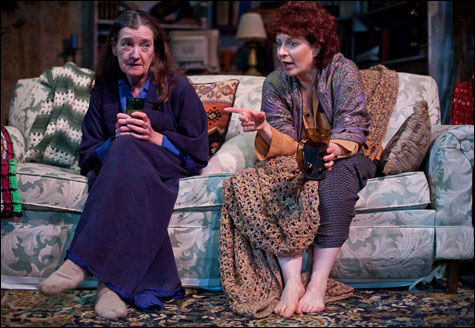
NO JUDI OR MAGGIE Then again, Paula Plum and Nancy E. Carroll aren't just some North Shore Laverne and Shirley. |
With apologies to Winston Churchill, The Breath of Life is a cliché wrapped in an enigma — or two. On the face of it, award-winning British writer David Hare's ruthless yet sentimental two-hander (at Gloucester Stage through August 2) is a standard confrontation between a betrayed wife and her husband's long-time mistress, the considerable buzz around its 2002 London debut generated by the fact that the words spoken by these two natural enemies emanated from the mouths of dueling Dames Judi Dench and Maggie Smith. Minus their luster, the work waited seven years for its American debut, earlier this month, from Peterborough Players, with Gloucester Stage not far behind.
But Hare, the author of such complex political explorations as Stuff Happens (about the run-up to the Iraq invasion) and Via Dolorosa (based on interviews he conducted in the Middle East), is no suds-meister. Even the intimate and sorrowful Skylight is less about irreconcilable lovers than about irreconcilable values. Here Hare weaves into his all-night confrontation of disparate, brainy women of a certain age (a marathon amalgam of tea, truth, and tussle exuding the air of a slumber party as well as that of the confessional) considerations of longing and loss that have less to do with the disillusioned barrister who's shafted both characters for a much younger woman and an American dream than with how an individual can maintain an independent, uncomplicit self and lead an honorable life down to the wire, when the title commodity slips away.

For its slacking in the wake of the 1960s, the socially conscious Hare, who was born in 1947, comes down with particular acerbity on his own generation, which he charges with "five years of protest" followed by "30 of acquiescence" and brands with the obituary "We left no loft unconverted." But the deceived wife of the play being a popular novelist on the track of a possible memoir, The Breath of Life also grapples with questions of "literary ethics" eloquently raised by American dramatist Donald Margulies in his Pulitzer-nominated Collected Stories — about whether a writer has any more right to plagiarize another's life than to hot-finger a bit of prose.
So if (as has been charged) little happens in Hare's two-and-a-quarter-hour drama, quite a bit is stirred up. And if, at Gloucester Stage, there are no sparring legends of the British stage on view, neither are Elliot Norton Award winners and uncommonly intelligent and articulate actresses Paula Plum and Nancy E. Carroll some North Shore Laverne and Shirley. As Madeleine, the reclusive mistress, Islamic-art scholar, and social activist in retirement, Carroll utilizes a direct, intense assault, only midway through taking on an English accent that goes in and out like the tide lapping the Isle of Wight, where the play is set. Plum, as justice-seeking-housewife-turned-pulp-fictionist Frances, adopts an English stodginess and lilt from the get-go. But facing off under Eric C. Engel's incisive, sometimes even poetic direction, on set designer Jenna McFarland Lord's frayed and cluttered expanse of beachfront dishevelment, both actresses bring blunt honesty and censorious wit to the work. And Plum, once she sheds her armor of outerwear for borrowed bohemian pajamas, achieves a doggedness that, however softer-edged and reflective, puts her dowdier character in better balance with Madeleine, who gets not only her noble memory of romance sparked and fled at the sacred feet of Martin Luther King but all of the best, caustically self-righteous and self-assured, American-bashing lines.
What can we say? We gave the Brits Cheney, Rummy, Dubbya, and the whole rogues' gallery of Stuff Happens. They gave us the aforementioned Churchill.